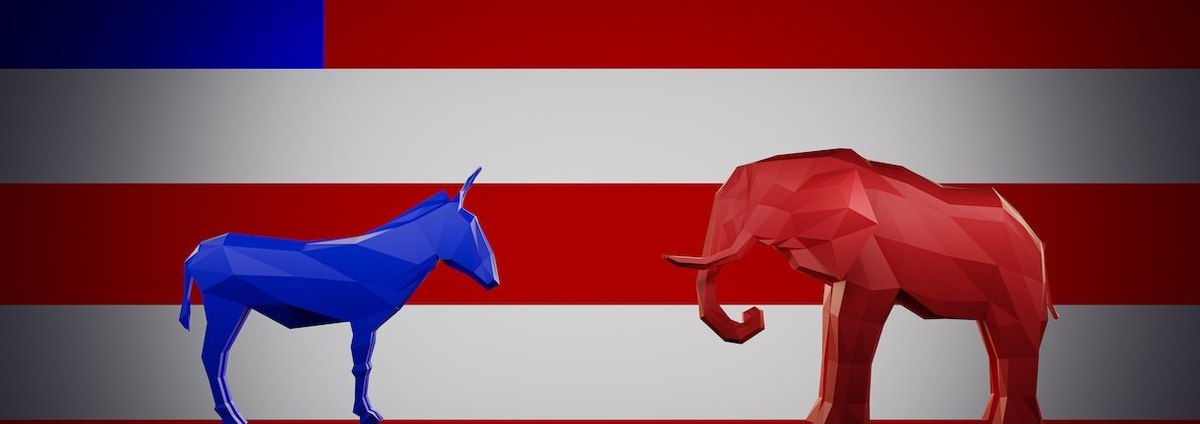A new YouGov survey asked Americans which positive and negative traits they associate with the Democratic and Republican parties. Each party is described as corrupt by 34% of Americans, and similar shares describe each political party as dishonest.
In a series of questions, Americans were asked which of 20 positive terms and 20 negative terms they think describe the Democratic Party, and which of the same terms describe the Republican Party. The terms were derived from an earlier survey that asked respondents, in an open-ended question, "Finish the following sentence: The Democratic Party is…" and an equivalent question about the Republican Party. The poll was conducted after Donald Trump's conviction on 34 felony charges, and before the first presidential debate.
Among the list of positive traits included in the poll questions, the positive descriptors Americans are most likely to associate with the Republican Party are patriotic (34%), strong (23%), and capable (22%). The positive traits Americans are most likely to associate with the Democratic Party — among those provided — are open-minded (27%), inclusive (24%), and responsible (22%). Relatively few see either the Democratic (10%) or Republican (9%) parties as winners. Among the biggest gaps in Americans' positive perceptions of the two parties: By 34% to 19% they are more likely to say the Republican Party is patriotic, and by 27% to 15% they are more likely to say the Democratic Party is open-minded.
The survey also presented Americans with a list of negative traits that they could select to describe each party. Around one-third describe the Republican Party as each of the following: corrupt (34%), dishonest (32%), hypocritical (32%), and extreme (31%). Among the options provided, the negative traits Americans are most likely to associate with the Democratic Party are corrupt (34%), dishonest (34%), and out of touch (31%). Among the biggest gaps in Americans' negative perceptions of the two parties: By 23% to 13% they are more likely to say the Republican Party is a cult, and by 24% to 17% they are more likely to say the Democratic Party is anti-American.
How do Democrats and Republicans see their own parties? Among the list of positive adjectives offered as response options, Republicans are most likely to describe their party as patriotic (64%), capable (48%), intelligent (47%), and realistic (45%). Democrats are most likely to describe their party as open-minded (57%), responsible (51%), respectable (49%), realistic (47%), and honest (47%). Only 32% of Republicans say their party is open-minded, and only 43% of Democrats say their party is patriotic. Just 30% of Republicans describe their party as honest. By 45% to 26%, Democrats are more likely to call their party inclusive; by 37% to 20% they are more likely to call their party modern.
Asked which negative terms describe the Democratic Party, 11% of Democrats say weak, 9% say incompetent, and 8% say out of touch. 67% of Democrats say none of the available negative options describe their party.
Among the available negative descriptors for the Republican party, 13% of Republicans say weak, 9% say out of touch, and 8% say corrupt. 66% of Republicans say none of the available negative options describe their party.
Majorities of Democrats and Republicans hold several different negative views of the other party. Among the negative descriptions offered, the ones Republicans are most likely to choose in describing the Democratic Party are corrupt (65%), dishonest (64%), and out of control (56%). The descriptions Democrats are most likely to choose to describe the Republican Party are dangerous (57%), dishonest (56%), corrupt (56%), and hypocritical (56%).
Democrats are much more likely to describe the Republican Party as racist (54%) than vice versa (36% of Republicans say the Democratic Party is racist). They also are more likely to describe the Republican Party as a cult than Republicans are to say the same about the Democratic Party (43% vs. 25%).
Republicans are much more likely to describe the Democratic Party as anti-American (50% vs. 34% of Democrats who chose this descriptor for the Republican Party). Republicans also are more likely to describe the Democratic Party as corrupt (65% vs. 56% of Democrats who describe the Republican Party this way), dishonest (64% vs. 56%), out of touch (53% vs. 44%), and incompetent (53% vs. 43%).
10% of Republicans describe the Democratic Party as consistent; 6% say the party is inclusive and 6% say it is well-managed. 63% of Republicans say none of the available positive descriptions fit the Democratic Party.
Most Democrats (59%) say none of the available positive descriptions apply to the Republican Party, though 13% of Democrats see the Republican Party as strong and 11% say it is patriotic.
— Taylor Orth and Carl Bialik contributed to this article
Related:
- Most Republicans say a criminal past is highly undesirable in a CEO; fewer say it is for a president
- Ahead of July Fourth, here’s what Americans think about fireworks, democracy, and the American Dream
- Hawks and doves: Changes in how Americans classify themselves and recent presidents
See the results for this YouGov poll
Methodology: This YouGov poll was conducted online on June 12 - 14, 2024 among 1,105 U.S. adult citizens. Respondents were selected from YouGov’s opt-in panel using sample matching. A random sample (stratified by gender, age, race, education, geographic region, and voter registration) was selected from the 2019 American Community Survey. The sample was weighted according to gender, age, race, education, 2020 election turnout and presidential vote, baseline party identification, and current voter registration status. Demographic weighting targets come from the 2019 American Community Survey. Baseline party identification is the respondent’s most recent answer given prior to November 1, 2022, and is weighted to the estimated distribution at that time (33% Democratic, 31% Republican). The margin of error for the overall sample in each survey is approximately 4%.
Image: Getty (OsakaWayne Studios)









